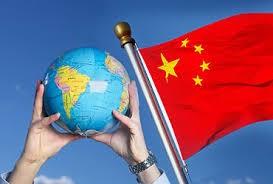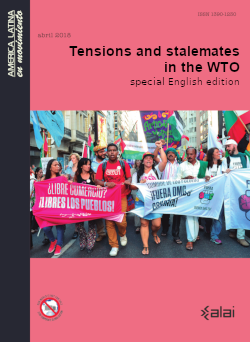The geopolitical dispute
In an increasing number of economic sectors we are now witnessing how the production chain is broken up step by step all the way down to the individual worker.
- Opinión

| Article published in ALAI’s magazine No. 532: Tensions and stalemates in the WTO 24/06/2019 |
The world is no doubt in a state of turmoil. Or should we rather acknowledge that nowadays it is no longer a temporal state of being, but rather, that we live under permanent transformation and in constant turbulence, as a result of technological development and an accelerated economy. The truth is that since the last century, history has undergone continued changes that have brought us in their unfolding to the current state of play: a scenario where the neoliberal capitalist model is itself in risk, with its basic pillars swaying while the economy is demanding new liberalization agendas to cement the model. Clearly, we are at a crossroads that can be unlocked either through more neoliberalism, or with a new model emerging from a new global economic powerhouse, or else by crafting all together a distinctly different and inclusive economy.
The transformation of production
Since the time of Adam Smith’s pin factory, many things have happened at the level of the economy that fueled capitalism’s mutation. We have witnessed three industrial revolutions, all of which have resulted in transformations in production and equally far reaching changes in labor. The fact is that present day work no longer resembles yesteryear jobs and employment, nor are companies alike or even comparable. Globalization and the fragmentation of production chains, coupled with an era of communications and finance, laid the ground for the current emerging reality that is taking hold: a new model of production that displays physically nonexistent companies as its greatest trophy.
How could this happen? Big transnational corporations have developed business models that are based on finance and the use and management of data, rather than producing goods and services for the economy. The real bargain today is managing virtual money and the data stored by companies in their servers, selling them, buying them, doing segmented advertising, developing and feeding algorithms and creating artificial intelligence to manufacture an increasingly broad range of new smart products…or as it is often called, the “internet of things”.
A new reality is taking shape with big transnational corporations that are registered in distant (or not so distant) tax havens, without employees, encouraging “entrepreneurs” to become their own bosses, masters of their own lives, using corporate portals and conveniences to find a job for themselves in the global economy. Hence, in an increasing number of economic sectors we are now witnessing how the production chain is broken up step by step all the way down to the individual worker, who has long ceased to be an employee in a relation of dependency with an employer. The UBER paradigm has rapidly expanded to all sectors in the economy.
In these circumstances, the economy in recent years could be analyzed on a regional basis: The global North in crisis in the aftermath of the subprime real estate loans bubble crash in the US, reaching all big economic centers through the financial system. Low rates of employment in Europe, facing terrorism within its borders and without foreign markets were to sell its produce. Up to now, the US has not yet been able to find the way out and dissatisfaction with the economy has led to an unexpected political turn.
Led by China, Asia has not stopped growing. It worked its way and found its place to be the powerhouse that sustained the global South as a whole, including Africa. China’s increasing leadership as a result of its economic transformation and market power, has made the world turn its focus towards the giant East that is now attracting greater attention. China recently became the country with the highest GDP worldwide –provided Europe is not regarded as one single economy—and its trade balance with the US became a problem that has triggered a silent war between them.
Latin America’s performance is also one that needs to be analyzed separately. It definitely grew and integrated massive scores of its population to the global middle class, with an unparalleled boom in consumption in the region. These rising middle classes demanded more and better services from the local politics, and the rate of GDP growth proved to be insufficient to satisfy their demands. One can well say that demand outpaced the region’s supply capacity, hobbling the political potential of governments.
Political developments and the trade agenda
Developments in the economy have witnessed mirroring correlative events at the political level, such as the most recent turn in Latin America from populism and Keynesian economics to neoliberalism and right-wing governments. And a weakened Europe after Brexit and other political expressions of government opposition to the European Union. Finally, the inability of the Democrats government in the US to get their economy back on track with their free-trade promises, gave Trump the opportunity to set up his political campaign for office based on a discourse against free trade and to win the elections naming new enemies such as China, in addition to other alleged historical enemies of the US.
What about international trade? Indeed, trade negotiations got paralyzed for an instant when Trump took office and threw a spanner on the Trans Pacific Partnership agreement. But companies and this new data-based economy need new trade rules that will further homogenize sovereign nations, in order to tap on comparative advantages and succeed in imposing their longed-for social dumping and race to the bottom. The electronic commerce agenda continued to gather steam because it is the key to achieve a fully liberalized economy and consolidate once and for all the neoliberal model as the big corporate conglomerates crave for.
The perplexity and obfuscation that followed left an “anti-free trade” image of Trump that was soon proven wrong, as trade negotiations including TISA and TTIP remained on course, as well as those around the WTO rules. Regarding the latter, in the past WTO ministerial in Buenos Aires in December 2017, the US government clearly stated its resolve to stimulate bilateral or regional trade instead for multilateral trade, when the US top negotiator abandoned the talks before the end of the meeting as an unequivocal indication that the US does not want to propel multilateral negotiations and relinquish any spaces of power to countries in the global South in general, and most particularly to China.
The truth is that economic reality trumped corporate wishes, and the TTIP never got approved and lies now buried as history. However, the TTP did not run the same fate and was inked once again in March 2018 in Santiago de Chile, this time without the US.
The neoliberal model underpinned on the legal fabric of international trade and investment protection negotiations seems to be clutching on straws in the face of widespread popular discontent and an economic reality that overrides it.
So, what next?
China, the crossroads and beyond
That China is emerging as the new global superpower is a fact. It weathered the global crisis with its massive domestic market and is now on a roll as the frontrunner. But what would a new world where China dictates the rules of the game look like? It’s hard to tell. What we know now is that it is capitalist but not neoliberal. It is capitalism, indeed, but not of the sorts we were used to. It is a market-based capitalist system with strong presence of the State and tight controls on companies and people alike. This is the context in which new trade rules on domestic regulation, State-owned enterprises, monopolies and e-commerce are unfolding. China claims that by 2030 they will be the leaders in the development of artificial intelligence, and AliBaba is currently the company with the biggest turnover worldwide, after debunking Walmart that had held that position for decades.
In terms of trade agreements, China is promoting a stalled Regional Comprehensive Economic Partnership (RCEP) –an agreement that seeks to enthrone China as the leading international trade powerhouse in Asia. Even though negotiations are ongoing, this agreement does not seem to be headed towards a successful outcome, and they still have a long way to go.
Trade rules, wherever they are being negotiated, seem to be stalled and astray. Although China has the upper hand and the odds are that it will benefit from this, the situation elicits the idea that the problem is, essentially, that citizenry is fed up and tired of saying over and over again that it does not want trade agreements that hinder national sovereignty. This is likely a favorable moment for us to push and advocate jointly for a new international trade model that revolves around inclusiveness as the main thread of discussion, rather than corporate business deals.
(Translation: REDES-Amigos de la Tierra Uruguay )
Sofía Scasserra is Researcher and Lecturer at the Instituto del Mundo del Trabajo Julio Godio-UNTREF, and Advisor on economic and international trade issues for FAECYS - UNI Américas. Twitter @SofiaScasserra
Del mismo autor
- Las plataformas web 23/08/2018
- The geopolitical dispute 16/05/2018
- Sí, volvimos al mundo 10/05/2018
- La disputa geopolítica 20/04/2018
- El costo laboral 18/12/2017
- Tecnología, comercio electrónico y empleo 08/12/2017
Clasificado en
Clasificado en:
Libre Comercio
- José Ramón Cabañas Rodríguez 01/04/2022
- Jorge Murga Armas 31/03/2022
- Jorge Murga Armas 30/03/2022
- Lori Wallach 22/03/2022
- Néstor Araujo 22/03/2022

